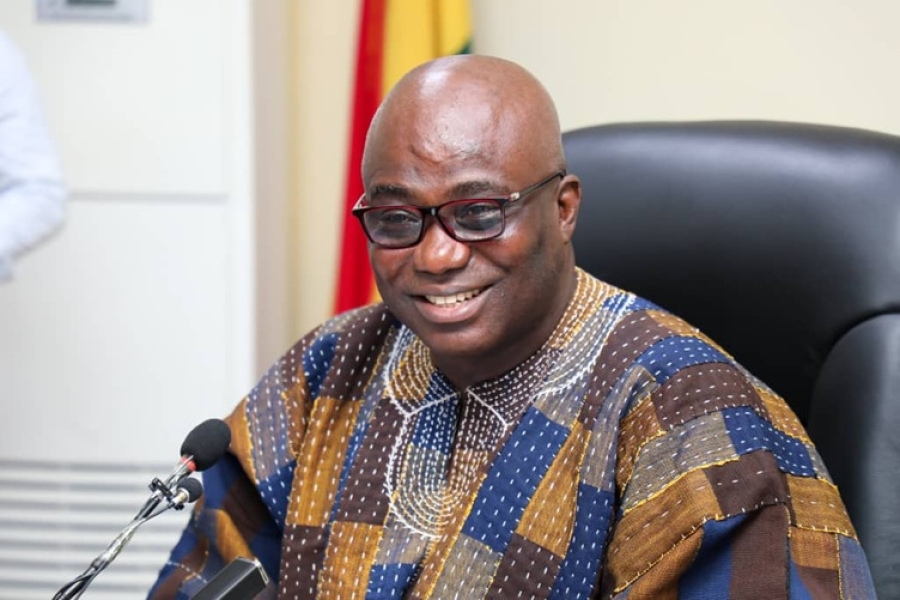The government has reaffirmed its commitment to tackling some of the nation’s most pressing economic challenges – food inflation, unemployment, and an over-reliance on imports – by placing agriculture at the heart of its 24-hour economy strategy.
This commitment was highlighted by the Minister for Food and Agriculture, Hon. Eric Opoku, during a livestream meeting co-hosted at the West Africa Centre for Crop Improvement (WACCI) at the University of Ghana.
The event was a platform to introduce the Volta Economic Corridor Programme, a key initiative designed to leverage agriculture for Ghana’s economic transformation.
Hon. Opoku emphasized the urgent need to address Ghana’s rising food import bill, which has now exceeded $2 billion and is trending towards $3 billion annually. He explained that this dependency on imported goods is a major factor in the cedi’s depreciation and has fueled a significant increase in food inflation.
“Food inflation, which stood at 5% in July 2014, jumped to 61% in January 2023. By 2024, Ghana was listed among the ten countries with the highest food inflation globally. Food prices and poverty move hand in hand; to fight poverty, we must tackle food inflation”
Hon. Eric Opoku, Minister for Food and Agriculture

A cornerstone of this new agricultural strategy is the Volta Economic Corridor Programme. The Minister announced the government’s plan to develop two million hectares of arable land into large-scale agro-parks.
These parks will be fitted with extensive irrigation facilities, allowing for all-year-round production. The goal is to ensure a consistent supply of food for households while providing a stable raw material base for agro-industries, enabling them to operate on a continuous 24-hour cycle.
Furthermore, the government is set to establish Agricultural Mechanization and Farmer Service Centres across the country.
These centres are designed to be a one-stop-shop for farmers, providing them with essential services and modern tools to enhance productivity. Farmers will have access to mechanized equipment, professional soil testing, high-quality fertilizers, improved seed varieties, and data-driven extension services.
“Science and agriculture are inseparable. With mechanization, modern inputs, and data-driven extension, every farmer can improve productivity,” Hon. Opoku added. These initiatives are aimed at transforming Ghana’s agricultural sector from a subsistence-based model to a commercial, technology-driven powerhouse.

The government’s vision is to not only achieve food self-sufficiency but also to turn Ghana into a major agricultural exporter. This strategic shift is being facilitated through key partnerships with international players, including China.
From Farm to Factory: The Feed Ghana Programme
Hon. Opoku also shed light on the Feed Ghana Programme, another critical component of the government’s agricultural transformation agenda.
This programme is designed to create a direct link between farmers and industries, thereby establishing assured markets for agricultural produce and guaranteeing prompt payment for farmers. The Minister explained that this direct-to-industry model is expected to build farmer confidence, encouraging them to expand their production and invest more in their operations.
By providing a reliable market and ensuring timely payments, the programme aims to eliminate the financial risks often associated with farming. This, in turn, is expected to attract more people, particularly the youth, into the agricultural value chain.
The assured supply of raw materials to agro-processors will enable them to expand their operations, creating thousands of jobs for the unemployed.

The Minister underscored the fundamental importance of a robust agricultural sector to the overall health of the economy, quoting a renowned agricultural scholar. “If agriculture goes wrong, nothing else will have the chance to go right,” he said, emphasizing that the Volta Economic Corridor, in particular, will be a game-changer.
Through strategic collaborations, it will not only address food security but also position Ghana as a major agricultural exporter, contributing significantly to the nation’s economy.
The meeting was a collaborative effort, with co-hosts from China, including the International Association for Popular Cooperation (IAPC) and the China-Africa Business Council, signalling international support for the initiative.
The support from the Embassy of the People’s Republic of China in Ghana further cemented the collaborative nature of the programme.



















